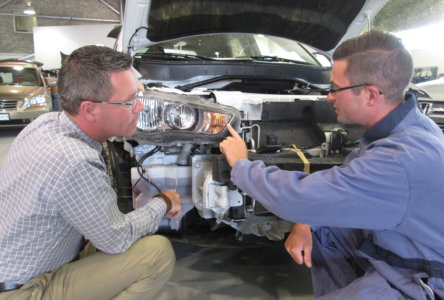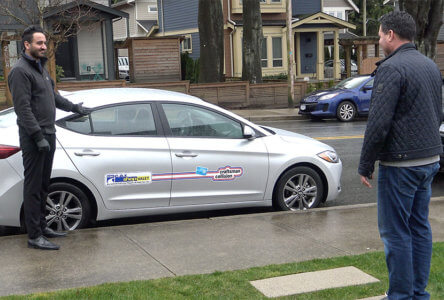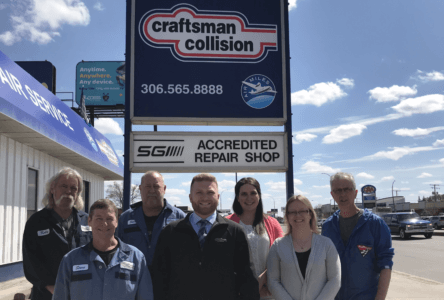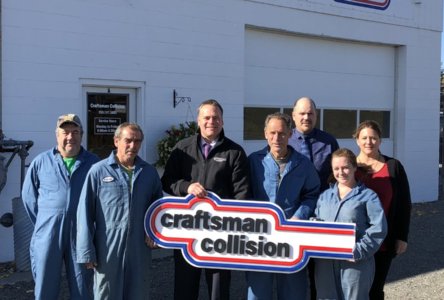How Canadian collision repairers are tackling the industry-wide labour shortage
Toronto, Ontario — August 9, 2016 — Canadians have a habit of comparing themselves to the Americans south of the border. It’s a national pastime. So when Texas-based Service King Collision Repair Centers announced a new training program for apprentices, Collision Repair magazine spoke to some Canadian collision repair executives about the state of tech education north of the 49th parallel.
Service King has just announced the company graduated an inaugural class of apprentice technicians through what is called the Service King Apprentice Development Program. Each class takes three potential body technicians and subjects them to an intensive 52-week hands-on developmental program. The students work under a dedicated supervisor. They’re tested for competence along the way. At the end, the company has a fully trained tech ready to go to work at one of the chain’s 299 stores. According to a pres release the company hopes to graduate more than 50 new techs through the program by the end of the year.
“This is an extremely proud moment in the young careers of these talented technicians who represent the future of Service King and our industry,” said Jeff McFadden, Service King President.
Training techs in-house is a smart way to win the war for talent.
Not only does a company generate its own labour supply, but these programs bolster the company’s reputation as a desired employer.
So, what are some of the bigger Canadian collision repair chains doing to train techs? Turns out, quite a bit.
Tony Canade, President of Assured Automotive, says his company is more likely to train painters and preppers in-house.
“On the paint and prep side we’ve had a lot of success training our own,” he says. “If someone is green but has a passion we can take them on. Learning skills on the paint side is generally less involved than on the body tech side. We can turn those around faster than a skilled technician.”
When it comes to techs, Assured is like many Canadian MSOs in that they rely on local community colleges and high school programs for talent. This is the Canadian way. “We’re big, big supporters of the high school and college programs,” says Canade. “We try and work with schools and colleges. Whenever we can grab a talented apprentice and bring them into the fold from one of the schools, we do.”
The realities of the industry are that it is tough to train a complete newbie as a tech. “Because the learning curve is so long, it’s challenging. What we try to do is to engage our licensed techs to help out. It’s going to slow the senior techs down, and it can be difficult to get them to do that. They’re making less money in their job. But they all started out that way and we remind them this is good for the overall growth of the industry,” says Canade.
Assured also operates in the hyper-competitive Greater Toronto Area (GTA) market. “The challenge is the same anywhere in the industry. When it comes to compensation appropriate to what they’re doing, it’s tough. There are limited resources in this space too compared to other trades,” says Canade.
Some trades offer high compensation right out of the gate, even to apprentices.
This, unfortunately, is not the case in collision repair, even if the job is well-paying once the tech is trained. “Once a tech has gone through his apprenticeship, the sky is the limit … but they are making less than an electrician to start off, and that’s the problem,” says Canade. “It’s hard to compete with that, especially in really competitive markets.”
Assured Automotive does help out new apprentices by providing tools and job assurances. “They don’t have to spend on tools. And if they go through school we’ll make sure there’s a position for them. We can guarantee that before they go in,” says Canade.
CARSTAR Canada takes a similar approach. The company makes a point of maintaining strong relationships with local community colleges to fill the talent pipeline.
“Our apprentices often come through community colleges like Centennial or Mohawk. We have relationships with those two schools,” says Matt Bell, head of human resources for CARSTAR Canada.
The company also has a relationship with the Tropicana program out of Toronto.
“It’s a pre-apprenticeship course for at-risk youth,” says Bell. Disadvantaged youth are given a hand-up into the auto body trade. “We bring them to head office for some training as well. We try to get connected to these youth who are interested in this industry,” says Bell.
The company also brings the parents of these kids into the office. It’s a way of putting minds at ease. “Frankly, it’s good for the parents. There is still this concern out there that this is a dirty, dingy industry,” says Bell. “People in the industry know that the collision repair industry is much more sophisticated today, and that being a tech can be a very high paying job. But we’re still battling that historical perspective. So we show off our new facilities and we talk about the long-term opportunities in this industry.”
At these meetings, the CARSTAR execs can field questions from the parents and allay worries or concerns. “We’ll explain that once you’ve got five years experience as a body tech you can go into insurance, you can own a shop. You can go a lot of places. You start to show that that if you start as a body tech it can be a job that can open doors to all these other opportunities in the industry. You can write your ticket,” says Bell. “Often people are not aware of all the long-term opportunities. It’s eye-opening for kids and parents who see the broad possibilities. We try to map out that long-term plan and create that awareness.”
The company also reaches out to trade-oriented students at events such as Skills Canada. CARSTAR sets up a virtual spray booth at that event. After the 2015 Skills Ontario competition the company invited all the participants and teachers back to head office.
“We invited all the auto body participants and the teachers to the office and gave them a day of I-CAR training,” says Bell. “Some of the teachers may be behind the curve on some of the latest procedures. So we give them a day of training as well.”
Maintaining the connections to the teachers in the colleges and high schools is a priority for CARSTAR.
“The strategy for training is partly a matter of staying connected to college networks. The Calgary skilled trades centre is great. We’re always asking, ‘What are the programs? How can we connect?’ We’ll send staff in to talk to the profs and make sure the local owner know the faculty. We’re assertive that way and it works well. We’ve seen our results improve through these approaches,” says Bell.
Having the local shop owner develop that relationship with the local school is encouraged at the company. “Some of our stores have done that for years. Their senior teachers know if they have a special kid to give us a call,” says Bell. “You have to set up a farm team system so you have new talent coming in all the time. You have to get that machine working.”
But there are also more intensive programs for apprentice training in this country. Programs similar to the hands-on, in-house Service King program exist out west.
Western Canada, California and China
Craftsman Collision operates a chain of 40 shops stretching from western Canada to California and China. The company also has what might be the most sophisticated and comprehensive apprentice training program in the country.
Rick Hatswell, Chief Operating Officer, designed the apprentice training program the company runs so that it is similar to what you find in other trades—a journeyman is awarded a portion of the apprentice’s salary so that the senior trades person is compensated to take the time and pass along skills to the new kid. When the bulk of your business is in Alberta and BC, the resource extraction industries can be great alternatives for young workers. You’ve got to put some money on the table to get the talent in the door. It’s just the nature of the labour market.
“We’ve been doing this for 10 years. I saw we were out of techs. We had to do something,” says Hatswell.
Today the company has a full mentoring program. The core of the program is a six-page contract that lays out the expectations and terms of the apprenticeship. For the first month the journeyman will spend two hours a day each day with the apprentice. The journeyman watches, trains and helps the apprentice understand the job. With the average age of techs now above 50, this is necessary for maintaining long-term viability. “Sure, we have kids that just don’t get it. But as long as the student looks promising we’ll take a newbie out of college and put them in our four year mentoring program,” says Hatswell.
The hours the journeyman puts into training the apprentice tapers off over the four years of the contract. In the last year the time is down to five hours a month. The journeyman gets a percentage of the apprentice’s hourly rate, an amount that also decreases over time. “That gets them going in the first year,” says Hatswell. “I find if you don’t incentive the journeyman … why would they slow down and help the kid? It’s too bad but it’s true. The contract is a guidebook to how to do that.”
But the biggest thing that keeps the apprentices coming back, says Hatswell, is the new toolkit the company provides every apprentice. The toolbox is presented to the apprentice on his first day. “The thing that really holds them here is the $4,000 worth of tools,” says Hatswell. “It’s through Snap-on. It’s a full tool kit with air tools and everything. It’s gifted to you if you stay for the four year apprenticeship and then one more year, for five in total … they love their tools. It’s like Christmas,” says Hatswell.
This is the kind of program that has allowed Craftsman to become a leading brand throughout the west. Hatswell is already thinking about a second part for the program.
Another important concern is helping out techs when they go down to school at a community college.
In the case of Craftsman Collision, a lot of the techs go to Vancouver Community College or Okanagan College.
“Here it’s mandatory to have government Red Seal,” says Hatswell. “So the techs have to go to college. But that can be difficult. The next thing we’re looking at is to help them at school when they’re out of town.”
The company is looking at ways they might be able to cover accommodations and pay some wages while the apprentice is at college for five weeks.
“They can’t get employment insurance until they’ve been there two weeks. And that’s tough. They can get stuck in Vancouver for five weeks. Accommodations for while they’re at school are expensive. They can’t afford a hotel. The drive from Chilliwack to Vancouver is 140 kms. It’s tough to commute everyday. So that’s the next thing we’re working on,” says Hatswell. The idea to help techs get their certification goes back to the 1990s when Hatswell was working on the floor.
“I thought we could do something here. I’m a tech and I grew up through it all, so I’m really focused on that,” he says.
It’s the kind of planning that will win the war for talent.
by Jeff Stanford, Staff Writer for Media Matters









